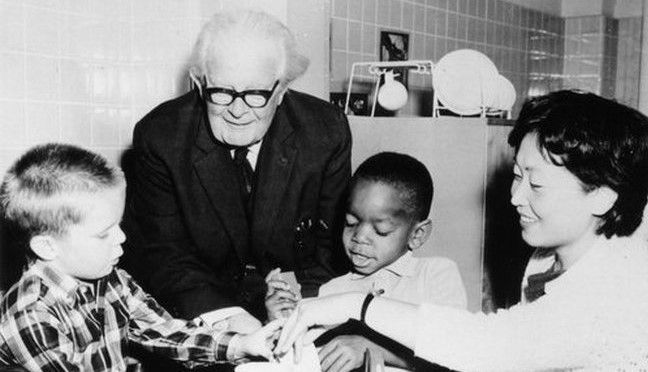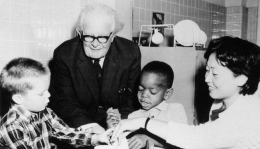This week, we'll look at Piaget's cognitivism theory, which explains how children learn as they grow. Piaget emphasizes that children develop abilities in cognitive structures that are established through experiences and stimuli beginning in infancy.My views about how children learn at a young age are consistent with Piaget's formulations, which is why I was eager to write about this theory.
Understanding children's cognitive growth and psychology at each level is, in my opinion, critical for improving and enriching children's learning.
I've witnessed firsthand how quickly kids learn. During the earliest years of a child's existence, the child's intellect and mental talents, such as memory, problem-solving, and reasoning, develop.
Piaget is a well-known psychologist who made groundbreaking findings regarding childhood and the development of intellect in children. He committed his life to studying developmental phases and understanding how our patterns of learning, thinking, and cognitive growth change at each level. In this reflection, I will describe Piaget's theory briefly.
This theory is significant to me because it explains how children learn so quickly at such a young age. Because the child’s setting is immersive and engaging, quick learning is possible. According to this theory, as the child develops, he will gain specific logic functions, including classification, imitation, interpretation, and subsequently, relationships. As the child learns their meaning, they will learn to talk and advance in this area.
According to Piaget’s theory, children progress through particular stages based on their intellect and capacity to understand mature relationships. All children in all countries experience these phases of child development in the same order. However, age may vary slightly between children.
Children do not know how to empathize like adults until they reach adolescence, and they have a "selfish attitude" depending on their age and aptitudes. It is natural for children to make mistakes.
Normal cognitive development happens during a child’s childhood, when kids "learn to think," or rather engage with the world in which they live. It refers to a sequence of developmental changes in a child’s life that are marked by stages from when they are born through preadolescence.
Piaget suggested four stages of child development, namely:
- Sensorimotor stage: from birth to two years.
- Ages 2 to 7 in the preoperative stage
- Concrete operational stage: 7 to 11 years old
- age 12 and above for the formal operational stage.
I'd like to examine the aspects of Jean Piaget's theory with which I disagree.
The four phases of development stated above are quite precise in terms of the age at which they occur, and I don't think they need to be because many children manage their mental activity earlier than others, and many do not manage it at all, or the formal status of operation has been attained. At the very least, they never put it into action.
In contrast to the other specialists and theory developers mentioned in my previous reflections, they have based their work not only on the cognitive domain of the child, as Piaget did, but also on the development of the child's environment and the social environment in which they live, as in my Behavioral Learning reflection.(Read more here.)
Piaget acknowledges that environmental influences play a role in cognitive development, but his view of child development ignores the effects of social interaction because Piaget studied and analyzed the stages from an individual perspective, not when a child plays in a group with other children his or her age. Piaget also questioned the overabundance of capacity that he perceived to be involved in the production of knowledge.
Finally, despite these contradictory aspects, in my opinion, a study of Piaget’s theory will help any teacher see how a student’s mind grows. The basic premise of Piaget’s thesis is that knowledge is a product of a person’s connection with their environment rather than a duplicate of reality. As a result, it will always be particular and unique.
Baca konten-konten menarik Kompasiana langsung dari smartphone kamu. Follow channel WhatsApp Kompasiana sekarang di sini: https://whatsapp.com/channel/0029VaYjYaL4Spk7WflFYJ2H







